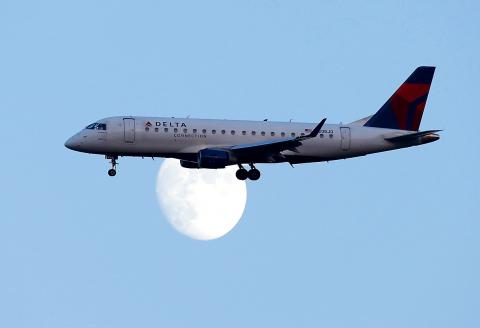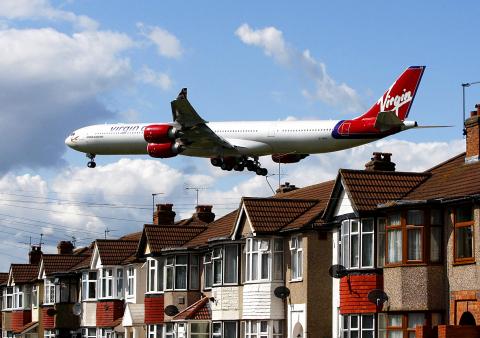Singapore Airlines yesterday said it is in talks to sell its 49 percent stake in British billionaire Richard Branson’s Virgin Atlantic.
The airline said in a statement it is in discussions with “interested parties” about a sale.
A person with knowledge of the possible deal told reporters that Atlanta-based Delta Air Lines Inc is in talks with Singapore Airlines about buying the Virgin Atlantic stake. The person requested anonymity because the talks are ongoing.

Photo: Reuters
Virgin Atlantic is the second-biggest airline at London’s Heathrow Airport behind British Airways, which is a partner with Delta competitor American Airlines. Takeoff and landing rights at Heathrow are limited, a barrier for airlines that want to add flights.
A Delta partnership with Virgin Atlantic on US-London routes would allow it to benefit from Virgin’s established position at Heathrow.
About 51 percent of Virgin Atlantic is owned by billionaire Richard Branson, who founded the airline in 1984. Singapore Airlines bought its stake from Branson in early 2000 for £600 million (US$962.8 million).

Photo: Reuters
Singapore Airlines said in its statement that the talks may or may not result in a deal.
The London-New York route is one of the world’s major air corridors and Delta has been undertaking a major expansion of its hubs at New York’s LaGuardia and John F. Kennedy airports.
Britain’s Sunday Times newspaper identified Delta as one of the interested parties and reported that the US carrier had approached Singapore Airlines directly over the stake.
If the sale goes through, Delta’s European partner, Air France-KLM, may then buy part of Branson’s 51 percent stake, which would see him losing control for the first time of the airline he founded, the report added.
Delta was not immediately available for comment.

Taiwan Semiconductor Manufacturing Co (TSMC, 台積電) would not produce its most advanced technologies in the US next year, Minister of Economic Affairs J.W. Kuo (郭智輝) said yesterday. Kuo made the comment during an appearance at the legislature, hours after the chipmaker announced that it would invest an additional US$100 billion to expand its manufacturing operations in the US. Asked by Taiwan People’s Party Legislator-at-large Chang Chi-kai (張啟楷) if TSMC would allow its most advanced technologies, the yet-to-be-released 2-nanometer and 1.6-nanometer processes, to go to the US in the near term, Kuo denied it. TSMC recently opened its first US factory, which produces 4-nanometer

GREAT SUCCESS: Republican Senator Todd Young expressed surprise at Trump’s comments and said he expects the administration to keep the program running US lawmakers who helped secure billions of dollars in subsidies for domestic semiconductor manufacturing rejected US President Donald Trump’s call to revoke the 2022 CHIPS and Science Act, signaling that any repeal effort in the US Congress would fall short. US Senate Minority Leader Chuck Schumer, who negotiated the law, on Wednesday said that Trump’s demand would fail, while a top Republican proponent, US Senator Todd Young, expressed surprise at the president’s comments and said he expects the administration to keep the program running. The CHIPS Act is “essential for America leading the world in tech, leading the world in AI [artificial

REACTIONS: While most analysts were positive about TSMC’s investment, one said the US expansion could disrupt the company’s supply-demand balance Taiwan Semiconductor Manufacturing Co’s (TSMC, 台積電) new US$100 billion investment in the US would exert a positive effect on the chipmaker’s revenue in the medium term on the back of booming artificial intelligence (AI) chip demand from US chip designers, an International Data Corp (IDC) analyst said yesterday. “This is good for TSMC in terms of business expansion, as its major clients for advanced chips are US chip designers,” IDC senior semiconductor research manager Galen Zeng (曾冠瑋) said by telephone yesterday. “Besides, those US companies all consider supply chain resilience a business imperative,” Zeng said. That meant local supply would

BIG INVESTMENT: Hon Hai is building the world’s largest assembly plant for servers based on Nvidia Corp’s state-of-the-art AI chips, Jalisco Governor Pablo Lemus said The construction of Hon Hai Precision Industry Co’s (鴻海精密) massive artificial intelligence (AI) server plant near Guadalajara, Mexico, would be completed in a year despite the threat of new tariffs from US President Donald Trump, Jalisco Governor Pablo Lemus said. Hon Hai, also known as Foxconn Technology Group (富士康科技集團), is investing about US$900 million in what would become the world’s largest assembly plant for servers based on Nvidia Corp’s state-of-the-art GB200 AI chips, Lemus said. The project consists of two phases: the expansion of an existing Hon Hai facility in the municipality of El Salto, and the construction of a